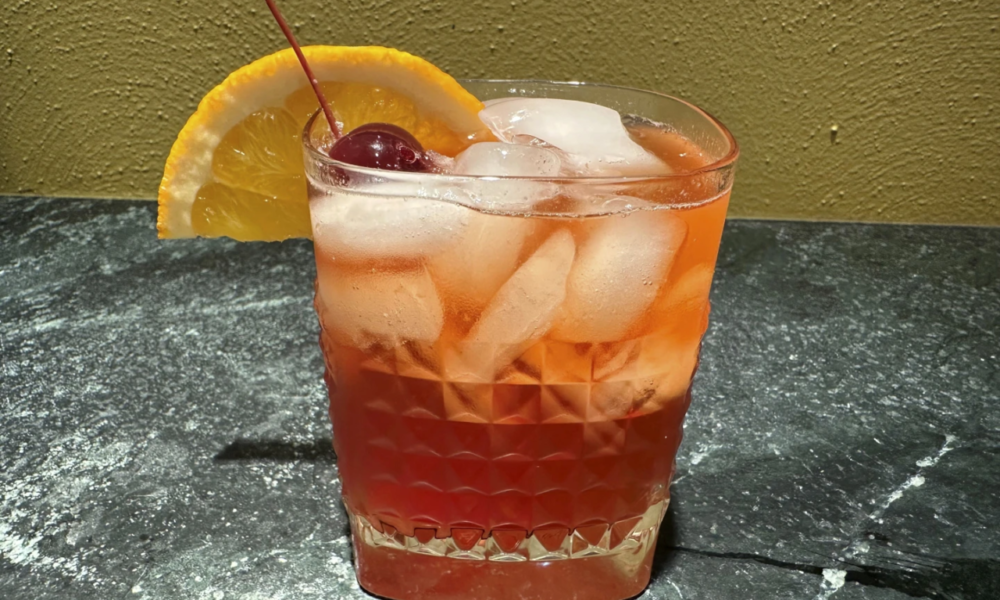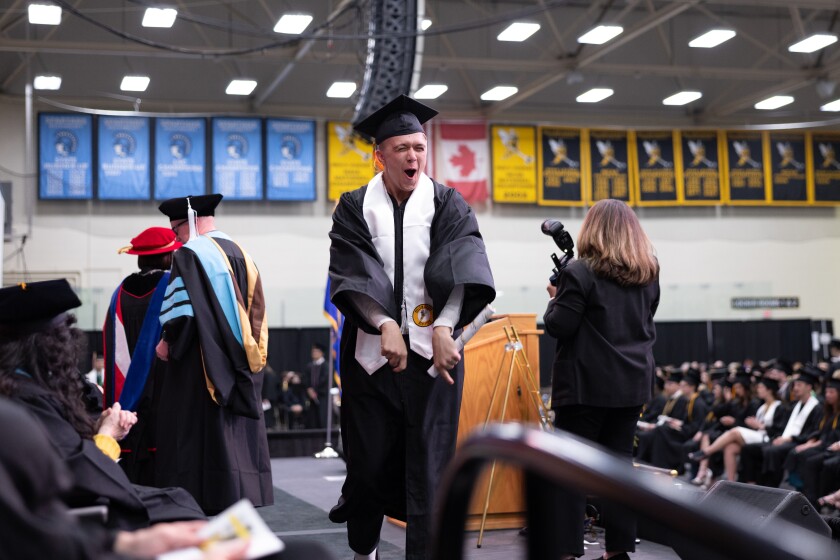The Ryerson University Student Center in Toronto has bird-friendly, patterned glass windows. Image: Rick Ligthelm
By Clara Lincolnhol
A Wisconsin Court of Appeals decision that upheld the state’s first ordinance requiring bird-friendly building construction could spread similar policies to other cities.
Already Middleton, Wisconsin, has passed such an ordinance following the ruling last October, said Brenna Marsicek, director of outreach at the Southern Wisconsin Bird Alliance.
The court’s ruling confirms that bird-friendly building ordinances don’t violate the state building code, said Matt Reetz, executive director of the Southern Wisconsin Bird Alliance.
Bird-friendly construction uses patterned glass to make windows visible to birds. Critics argue that the ordinances impose requirements that are additional or more restrictive than uniform statewide standards, according to court documents.

White dots make the windows of the Consilium Towers in Toronto visible to birds. Image: Christine Sheppard
Madison passed the state’s first bird-friendly ordinance in 2020. Local residents had expressed the need for bird-safe buildings after witnessing birds that died after striking windows, Marsicek and Reetz said.
But building developers and real estate agents sued, claiming such ordinances conflict with the state’s uniform construction code. It was the first time a bird-friendly ordinance had been legally challenged, Reetz said.
An initial circuit court ruling in August, 2022 said the ordinances are valid exercises of zoning power. They regulate features of buildings and do not impose construction standards. Developers appealed.
As the legal battle continued, other communities put similar ordinances on hold, Reetz said. But now, with the case settled, Wisconsin communities can look to the ruling with confidence while crafting legislation.
“If they were able to successfully remove the ordinance it probably would have affected a lot of other municipalities’s ability to institute their own bird-safe ordinances,” Reetz said.
About 599 million birds die each year from window collisions, according to the American Bird Conservancy. The problem has always been a topic of concern among bird conservation groups, but it hit mainstream news in 2024, Reetz said.
This year a window collision killed Flaco, a beloved owl living in New York City. And a staggering 1,000 migrating songbirds died in one night after flying into the McCormick Place in Chicago. These incidents incited public outrage and led to recent demands for more protective legislation.
Four Great Lakes states – Illinois, Wisconsin, Minnesota and New York – have adopted bird-friendly regulations, according to the American Bird Conservancy.
A set of guidelines and recommendations for the development of efficient policy is listed by the American Bird Conservancy. It rates Madison’s ordinance as “recommended with reservations.”
Reetz said that the rating is most likely because the ordinance only affects taller buildings. But the ordinance is a step in the right direction.
“Hopefully it opens the door to better, more comprehensive, more effective solutions in the future,” he said.
Although some ordinances are better than others, any ordinance is better than nothing as it saves birds, said Bryan Lenz, glass collisions program director at the American Bird Conservancy.
Some ordinances fail to include building design rules, are optional or only impact certain sections of buildings or only apply to buildings of certain stories, he said.
An unrecommended ordinance “just doesn’t go as far as we would like it to,” Lenz said. “Even the “not recommended” (ordinance) is still a good thing and it’s still saving birds.”
The conservancy’s list serves as a guideline for policy making, he said. Cities then have a reference as to what better policy looks like.
Birds mistake windows as open space, he said. Their forward facing field of vision isn’t as great as people’s. They don’t understand the architectural cues that people do. Besides, people run into glass all the time.

“If I went downtown and put a bunch of large clear glass panes in the street, people would smash into those constantly,” Lenz said.
Companies make bird-safe patterned glass for commercial buildings. The market is not there yet for residential buildings, but there are ways people living in them can make their windows safe.
The easiest thing to do is put an external screen on the outside of your window. People can apply rows of small dots to their windows to reduce collisions, Lenz said. More information is listed on the American Bird Conservancy’s website.
One of the greatest barriers to combating bird window collisions has been the public’s lack of knowledge of what to do, he said.
“We need to have people hear about this a whole bunch and get it normalized,” Lenz said. “The more attention it gets, the better.”
Residential buildings (1-3 floors) account for 43.6% of collisions. An individual residential building kills on average 2.1 birds annually. There are 122.9 million residential buildings in the United States. An estimated 258.1 million birds die from these buildings annually.
Low-rise buildings (4-12 floors) account for 56.3% of collisions. An individual low-rise building kills on average 21.7 birds annually. There are 15.1 million low-rise buildings in the United States. An estimated 327.67 million birds die from these buildings annually.
High rise buildings (12 or more floors) account for 0.1% of collisions. An individual high-rise building kills on average 24.3 birds annually. There are 0.5 million high-rise buildings in the United States. An estimated 12.15 million birds die from these buildings annually.
The percentage of high rise collisions are low because there’s a smaller number of high rise buildings throughout the landscape. However, high rise buildings are dangerous and can lead to mass casualty events, Lenz said.





/cloudfront-us-east-1.images.arcpublishing.com/gray/FCJF6X2R6FGFZBR4ZBHSJ442D4.jpg)


























